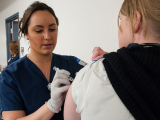Aug 31, 2010 (CIDRAP News) – Three vaccine makers are making label changes to their seasonal flu vaccine doses for the US market, warning healthcare providers that the tip caps on syringes may contain natural rubber latex, an allergen to sensitive individuals. This development will slightly reduce the number of doses and delay delivery of some doses by 2 or 3 weeks.
The labeling change, required by the US Food and Drug Administration (FDA) and the partial withdrawal of the pediatric version of CSL Ltd's seasonal flu vaccine earlier this month has reduced the projection for total doses this year to 160 million to 165 million, slightly down from an earlier 170 million dose estimate, according to the most recent information from the Centers for Disease Control and Prevention (CDC).
Federal officials have warned that the vaccine manufacturing process can be unpredictable, and the amount of doses delivered can vary from early estimates.
At an Aug 5 meeting of the CDC's vaccine advisors, a representative from Merck, which distributes CSL's Afluria, said CSL's decision not to distribute the multidose vials would reduce the US seasonal flu vaccine supply by 5 million.
Despite the lower number of doses, the total represents a record number of seasonal flu vaccine doses, which comes as the CDC launches a universal flu vaccination recommendation. The seasonal flu vaccine, which includes the 2009 H1N1 virus strain, is now recommended for nearly everyone except for babies younger than 6 months.
GlaxoSmithKline, Sanofi, and Novartis have all sent letters to customers or physicians notifying them about the latex labeling changes. News of the change and its effect on flu vaccines supplies and deliveries first surfaced on Aug 25 in a report from the online newsletter American Academy of Family Physicians (AAFP) News Now.
Sanofi said in its letter that all injectable flu vaccine products that use syringe tip caps provided by Helvoet Pharma are subject to the labeling change. Sanofi said the FDA told manufacturers in July that it didn't have enough documentation to support the company's latex-free claims.
Meanwhile, Glaxo said its letter that the labeling change would reduce the number of Fluarix doses that will be delivered to the US market, and Sanofi said the change would delay shipments of Fluzone by 2 or 3 weeks.
Glaxo told customers that the changes weren't sparked by any adverse reaction reports, but urged physicians to report any latex-related reactions to the CDC's Vaccine Adverse Event Reporting System (VAERS) or to the company. Novartis urged physicians to ensure that emergency measures are in place for patients who have an anaphylactic reaction.
Diane Peterson, an editor for the National Influenza Vaccine Summit's Web site and associate director for immunization projects at the Immunization Action Coalition, based in St Paul, told CIDRAP News that she didn't think the delay and scaled-back doses will have much of an impact on flu vaccination activities.
"The bottom line is that instead of early delivery of vaccines for this season, it will be more like the normal timing of vaccine delivery," she said.
The chance of an extremely allergic person having a reaction from the latex residue on the needle is unlikely, but could happen, Peterson said.
Only one manufacturer makes the cap tips for the flu vaccines, so all prefilled seasonal flu vaccines are affected by the warning. Some already had a notice in their prescribing information, but some had to relabel their products, she said.
Peterson said Glaxo notified National Influenza Vaccine Summit members on Aug 12 that it expects to provide between 32 and 33 million doses of Fluarix and Flulaval combined, which represents fewer doses than originally planned. Sanofi said it is on track to deliver the 70 million doses that it originally projected.
In an Aug 6 letter to healthcare providers, Anne Schuchat, MD, director of the CDC's National Center for Immunization and Respiratory Diseases, emphasized the new universal flu vaccination recommendation and urged providers to start administering the vaccine as soon as it's available. She said that offering the vaccine "at any opportunity for every patient is essential."
Even though not all medical practices will stock unlimited quantities of flu vaccine, she said it is still important that patients get the vaccine for themselves and their family members. "Studies show that your recommendation makes the difference in convincing patients to seek influenza vaccination," Schuchat wrote.
See also:
Aug 25 AAFP News Now report
Aug 16 Glaxo letter to providers
Jul 20 Novartis letter to providers




















